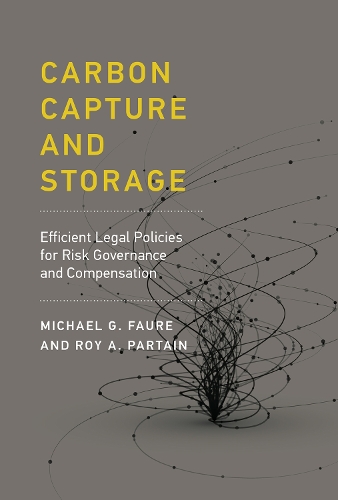
Carbon Capture and Storage: Efficient Legal Policies for Risk Governance and Compensation
(Hardback)
Publishing Details
Carbon Capture and Storage: Efficient Legal Policies for Risk Governance and Compensation
By (Author) Michael Gebert Faure
By (author) Roy A. Partain
MIT Press Ltd
MIT Press
14th April 2017
United States
Classifications
Professional and Scholarly
Non Fiction
Nuclear issues
Environment law
628.53
Physical Properties
Hardback
376
Width 152mm, Height 229mm, Spine 19mm
Description
A theoretical and practical analysis of the complex liability issues raised by carbon capture and storage systems for containing greenhouse gases.Carbon capture and storage (CCS) systems inject highly compressed carbon dioxide gas deep into geological formations in order to contain the gas, and its harmful effects on the planet, for the foreseeable future and beyond-for centuries or even millennia. Used effectively, CCS could lessen the impact of climate change while carbon-free energy sources are developed. And yet CCS is not widely deployed. In this book, Michael Faure and Roy Partain offer a theoretical and practical discussion of one of the main obstacles to CCS adoption- complex liability and compensation issues. Faure and Partain point out that current liability rules are unclear in their application to CCS. Causation is complicated, and the timeline of hundreds of years goes beyond the lifetimes of people or corporations. Examining the subject from legal and economic perspectives, they consider whether rules of civil liability can govern CCS risk; how a liability system might address the open-ended timeline; what role public and private regulatory measures could play; and whether compensation should be provided from public or private resources. They investigate the utility of different forms of insurance and of such financial tools as guarantees, deposits, and catastrophe bonds. They offer not only a rigorous framework for assessing policy but also a summary of policy recommendations they develop from their findings.
Reviews
What makes this book so successful is its sensitivity to the reality of the challenge of cutting carbon emissions. Faure and Partain do not endorse CCS, but they do explain the approach that could be taken to help offset the risks presented by this type of technology, albeit though, as they point out, it is not yet possible to provide a definitive answer. Nevertheless, legal experts and policymakers interested in climate change will find this book an indispensable source.
This Century's Review, December 2017Author Bio
Michael G. Faure is Professor of Comparative and International Environmental Law at Maastricht University and Academic Director of the Maastricht European Institute for Transnational Legal Research. Roy A. Partain is Reader at the University of Aberdeen School of Law.
